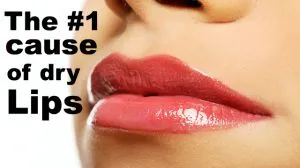Most of us reach for lip balm or chapstick when we have dry lips without a second thought. But is your body actually trying to tell you something with chronic chapped lips?
There could be an unknown nutrient deficiency, allergy or health condition causing dry lips.
Nutrient deficiencies or excesses
If you take more than 25,000 IU of vitamin A per day, you’re consuming too much of this vitamin. A lack of vitamin A is also linked to skin issues. Either way, supplementing isn’t the way to go. Get your vitamin A from whole foods instead, such as yellow and orange vegetables or liver. The body is intelligent in the way it handles nutrients from whole foods, whereas supplements can be overbearing and cause toxicity.
Perleche, or angular cheilitis, can cause chapping and cracking in the corners of the lips, with an underlying fungal or bacterial infection. This is caused by vitamin deficiencies such as iron, zinc or riboflavin (B-2), which leave the body ripe for infection. Good sources of B-vitamins include eggs, leafy greens, beans, nuts, meats and fish. You can get more iron from beef, lamb, liver or dark chocolate, and zinc from shellfish and pumpkin seeds.
Conversely, if you take too many vitamin B12 supplements, you may develop an allergy to cobalt, which causes dry lips with a crusted appearance. Again, getting B12 from whole foods such as meat, dairy and eggs is the best way, so that the body can naturally regulate its supply.
A lack of essential fatty acids can also leave tissues dry and crinkly. Consuming nuts, seeds, avocados and oily fish can help rectify this problem, as can upping collagen consumption through supplementation or eating bone broth to keep the skin elastic.
Toxic products and medications
Many brands of toothpaste, shampoo, face wash and soap contain the lathering ingredient sodium lauryl sulphate. Reports indicate that this ingredient can cause irritation and dryness. Also check the ingredient list on self-care products for alcohols, which dry out the skin.
Other potentially allergenic ingredients in commercial products could also cause chapped lips:
- Guaiazulene
- Propyl gallate
- Phenyl salicylate
- Salol
Certain prescription medications, like Accutane, blood pressure medications, diuretics, or prochlorperazine for vertigo can cause loss of fluids leading to chapped lips. Over-the-counter decongestants can also dry out the mucous membranes too much, leading to uncomfortably dry mouth and lips.
Underlying health conditions

Excess saliva on the lips or corners of the mouth can cause cracking and chapping. This could occur from licking the lips too much, or from ill-fitting dentures or missing teeth. Saliva contains enzymes which can damage the skin, and the moisture leaves an inviting environment for an angular cheilitis infection.
On the other side of the coin, too little saliva caused by respiratory ailments restricting breathing through the nose will often result in a dry mouth and chapped lips. These could be things like chronic sinusitis, allergic rhinitis or sleep apnea. Using probiotics to support the immune system and reduce inflammation can help with these conditions.
Finally, the lips are a good indicator of overall hydration level. If the lips are dry, there’s a good chance the body is lacking hydration. However, this doesn’t mean that drinking more water is the only thing you should do.
Over-consuming water can exhaust the kidneys and dilute vital electrolytes. Be sure to investigate the possibility of other health conditions that can cause dehydration. The most common of these is undiagnosed or uncontrolled diabetes. A whole-foods ancestral diet can help bolster hydration with more vegetables and fruits, as well as balance blood sugar to manage diabetes.
-The Alternative Daily
Sources:
http://www.doctoroz.com/blog/audrey-kunin-md/many-hidden-causes-chapped-lips
http://www.symptomfind.com/health/causes-of-chapped-lips
http://www.huffingtonpost.com/thomas-p-connelly-dds/dry-lips-cold-weather-causing-chapped-lips_b_804245.html
https://experiencelife.com/article/what-your-body-is-trying-to-tell-you
http://www.sciencedirect.com/science/article/pii/S0190962201025907
